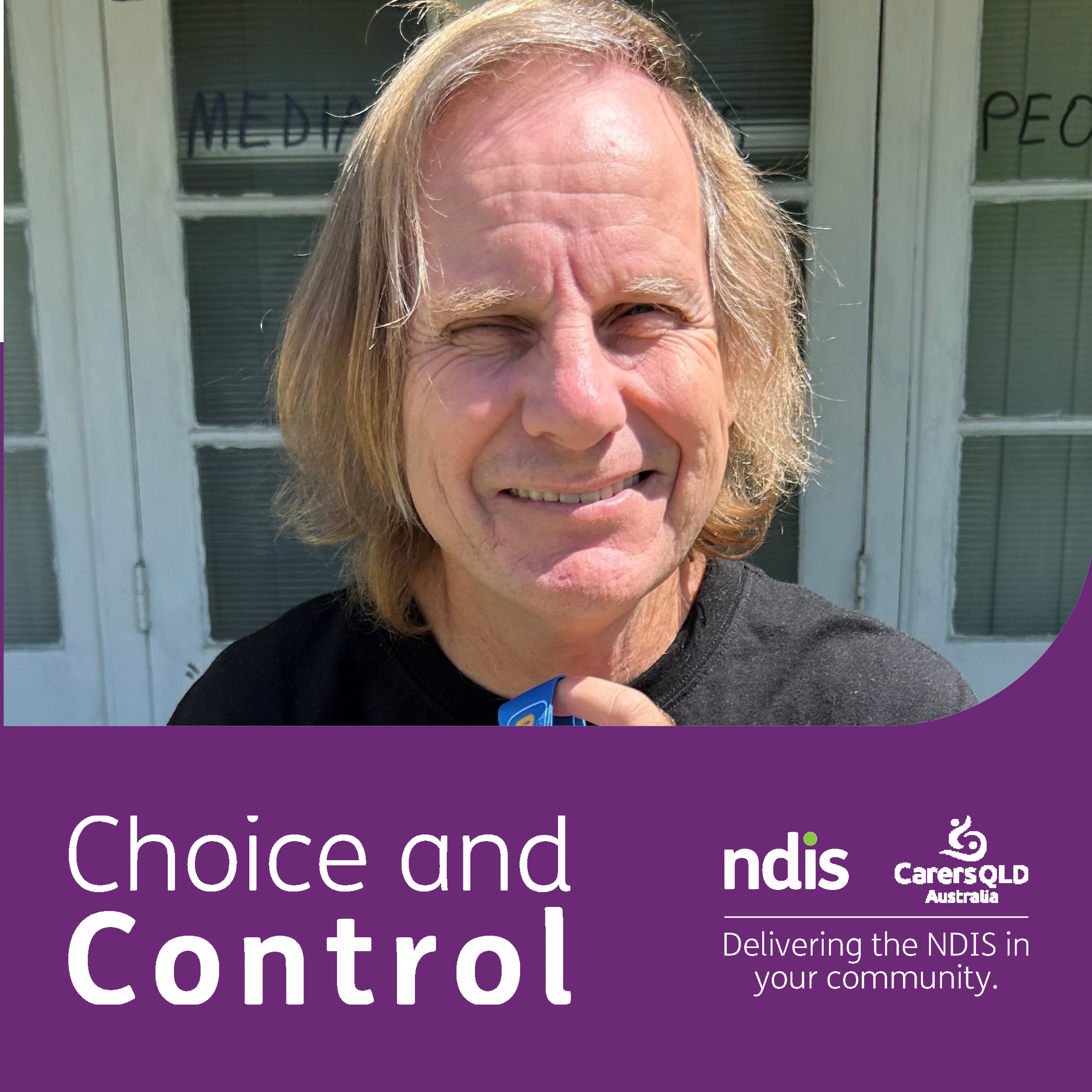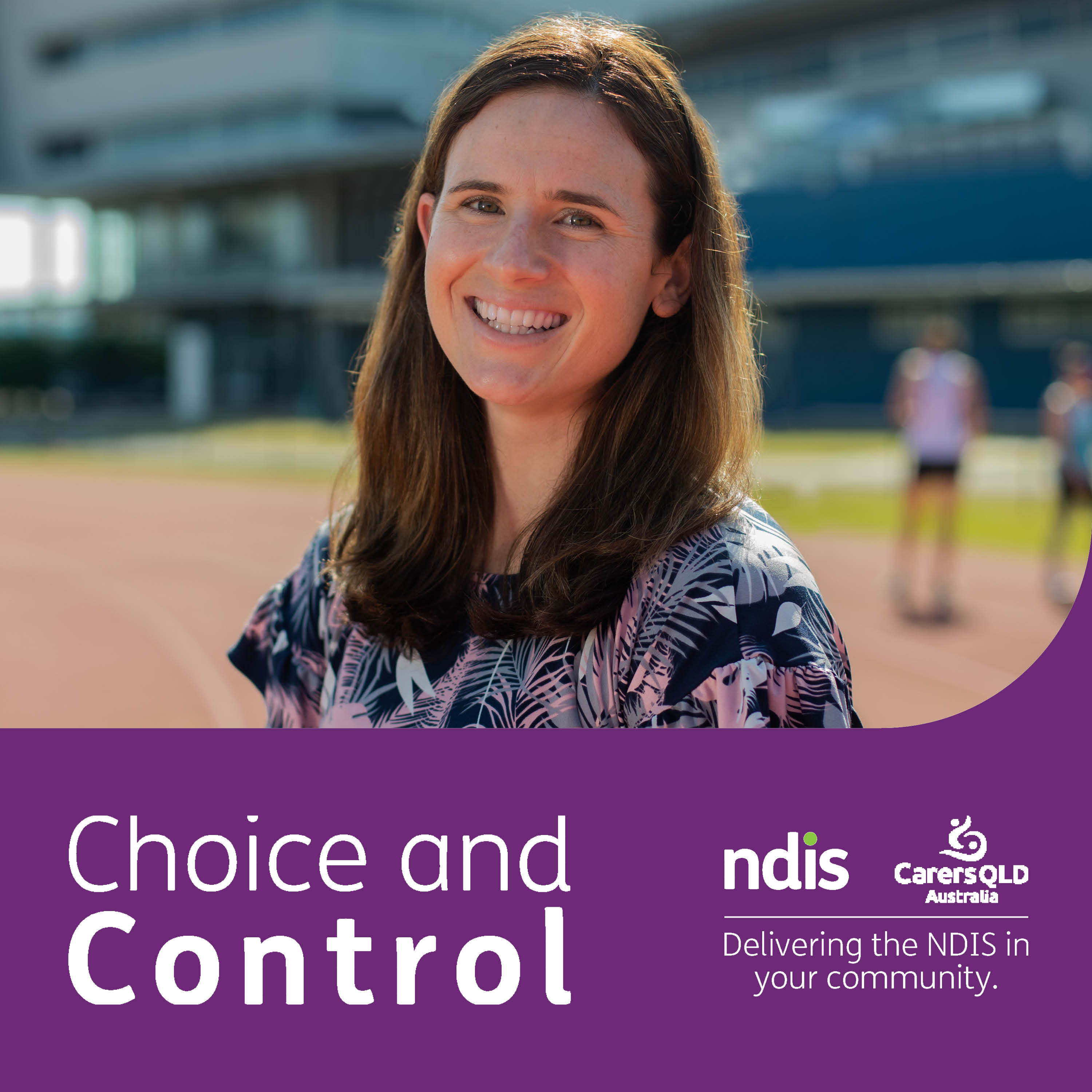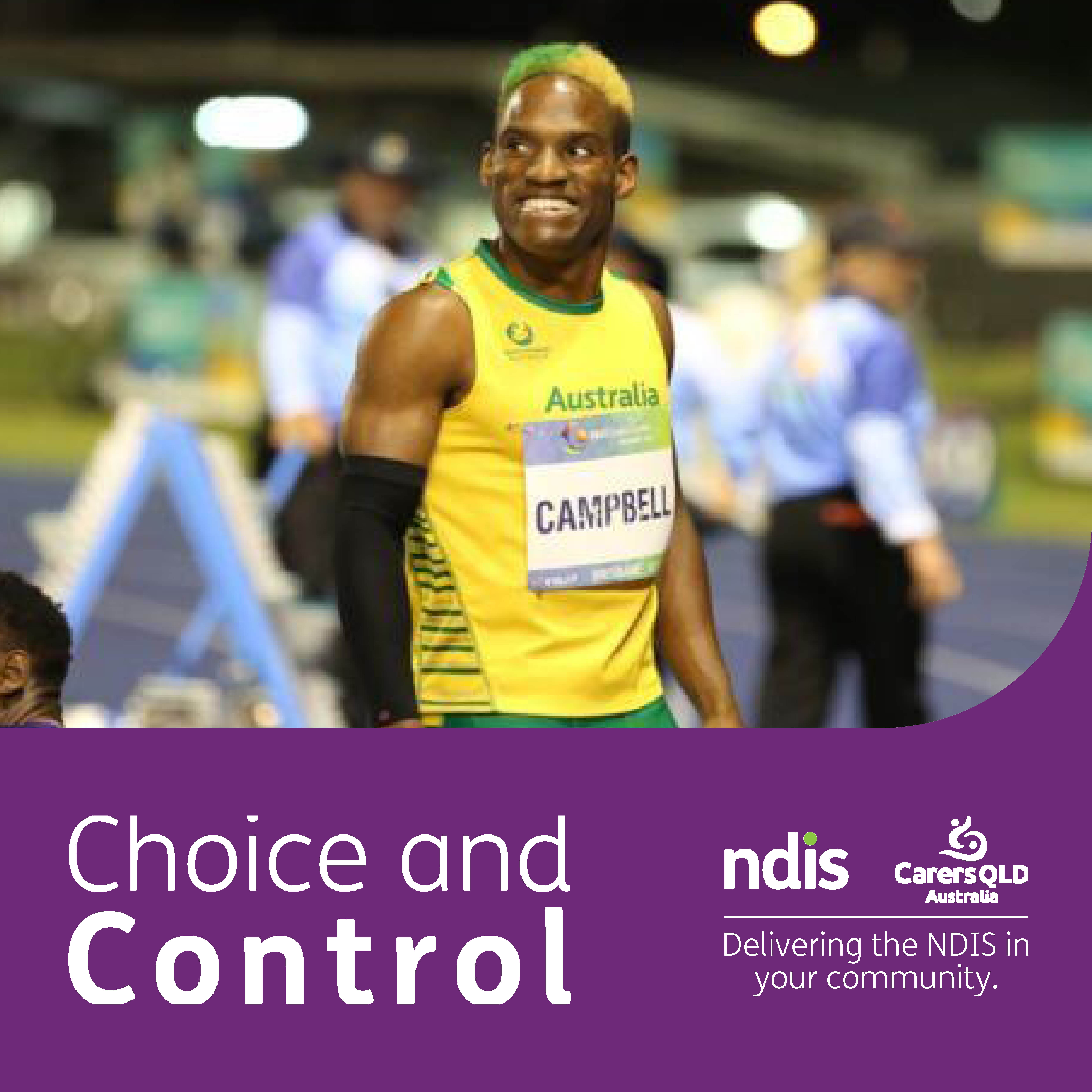Speaker 0 00:00:05 Choice and control a podcast, celebrating people with disability in this season, we're talking about access inclusion and the national disability insurance game. This podcast series is brought to you by carers Queensland and local area coordination partner in the community.
Speaker 1 00:00:23 Hi, I'm Jody van Wetering today. I'm talking to Rebecca Johnson, a young artist from Rockhampton. Who's living with bipolar disorder and chronic illness. Despite it being a really rough year, Rebecca has come out on top with some answers about her health and some amazing achievements with her artwork, even the stars of new business.
Speaker 2 00:00:43 Originally, I was always interested in music. And so when that kind of became difficult with my physical health, I always found that when I was sick, I would turn to making visual locks. Cause it's a lot quieter and not having to deal with, I guess, people watching while I'm doing it. And then that kind of turned into a way of expressing how was feeling with mental illness and, and physical illness and being able to kind of portray how I'm feeling and what I'm thinking in a way that didn't require me to talk.
Speaker 1 00:01:19 Now, Rebecca is sharing her voice and her vision with more people through her art. She's part of an exhibition run by carers Queensland. We'll find out more about in just a moment. And she also has her artwork on the cover of a 20, 21 calendar.
Speaker 2 00:01:32 That's buy off from the margins, which is based in Brisbane and they created the competition for people facing adversity. So it covered everything from mental illness, um, physical disability to indigenous people and people that are living in rural communities. Um, so I entered it with two pieces, um, that kind of spoke about my relationship with my mother and how she has kind of always been the person that I can lean on. And that can be there for me and comfort me when I'm struggling. One piece, which is called mothers and Bryce, which won the Andrews lineup award. And then my piece called me mother before I disappear, which was lucky enough to be on the cover of the, uh, calendar for 2021 and be a part of that with 11 other great artists.
Speaker 1 00:02:27 How exciting, how did that feel when you found out you were going to be on the cover?
Speaker 2 00:02:31 Probably a bit surreal. Um, it was really exciting and a bit nerve wracking and I guess it, most of all felt really validating and that what are making is something that doesn't just hold value to me, but to other people,
Speaker 1 00:02:49 Rebecca also has a pace in the VCs may art exhibition run by carers Queensland. It's a celebration of the achievements and talents of people with disability, from professional artists, right through the work from kids. It's a touring exhibition and we've just delivered it to the banana shy, regional art gallery and biller Wheeler, where it's going to be on show until early March. Rebecca's even sold the piece that she had involved in the exhibition of realistic depiction of three salmon called even in death.
Speaker 2 00:03:18 Yes. Um, my father had caught three fish and, um, taken a photo of them for me to paint and I painted it without knowing why, but just, I felt very drawn to it. And it kind of came up with the idea afterwards that it was kind of about life and death and the death of kind of the person that I was before I was diagnosed with chronic illness and mental illness and has kind of allowed me to, I guess, more than the person that I was through drawing something that is probably a bit morbid, but it's kind of going through the same life death cycle. Yeah.
Speaker 1 00:04:08 That's how it felt. It felt like, like a grieving, like a loss, that process of getting diagnosed.
Speaker 2 00:04:14 Yes. It, I spent a long time, well with her, all of my teenage years, going to doctors and try and work out what's wrong. And because I was never given a definitive answer, um, I was given the diagnosis of chronic fatigue syndrome, which is a diagnosis by exclusion. So it was never really a definitive, this is what you have. So it took me years and years of learning that I've lost the person that I was in regards to my physicality and being able to move and just do things and walk and you shower with on assisted and kind of realizing that I've lost that part of me. But now there's the birth of something new and a new way of living with trying to learn, to accept my situation, apartments out whole world of different ways. I can try to help myself with accessibility and learning how to live again, you know, Norway,
Speaker 1 00:05:26 One of the things that for instance came up when I was speaking about cook, who is a lady who was diagnosed well into adulthood with autism, was it finally getting the diagnosis? She found the answers and the community and things starting to make sense, but was that a bit unsatisfying that you didn't really have those answers yet?
Speaker 2 00:05:45 It was really hot and, you know, seven or eight years of just feeling like all the pieces aren't in place. Um, and knowing that this something wrong with me, but kind of, I guess the medical community saying you'll grow out of it or, you know, all teenage girls have low blood pressure. So, you know, just cause you're passing out, like that's fine. If it happens a few more times, then we'll worry. Um, it's just kind of being told that if you don't sick enough, it's not sick enough to worry about. And yet I was still not able to go to school and not able to live a circled normal life.
Speaker 1 00:06:31 Where are you at now? Do you feel like you've got the answers now or is it still feeling a bit vague?
Speaker 2 00:06:37 Um, I think we finally worked it all out. Um, it took about five years of with the diagnosis of chronic fatigue to then realize that this whole time I've been having irritable bowel syndrome quite severely, um, which is obviously impacting the fatigue side of things. And then this year, the diagnosis of bipolar disorder, I guess, tied it all together when realized that also how much of a connection there is between the brain and the gut and fatigue. And heartfully now working on old parts of it, oscillated that it can kind of start to feel a little bit more calm
Speaker 1 00:07:22 And has expressing yourself through art or through music through craft. Has that helped as you've been going through that journey?
Speaker 2 00:07:31 Uh, I think it was the only thing that kept me going, um, feeling like I had somebody to put my energy and my thoughts and my, especially my feelings into made it feel like if I had something that came out of it, that was good. Made me feel like it was worth the struggle and worth going through the pain, especially the emotional pain that I have been having with the bipolar. It made it feel like even though this is something really hard and I don't want to handle it, at least I'm getting something creative out of it. In the end,
Speaker 1 00:08:09 If you were like diagnosed or you acquire a disability later in life that can bring a need to reevaluate who you are and what that means for you. It can also mean I'm taking a lot of internalized ableism, negative ideas about disability. You might have unconsciously picked up, even if you have disability yourself.
Speaker 2 00:08:27 I still struggle with the idea of identifying as disabled because I feel like that's offensive to people with more visible disabilities, but then I acknowledged that other people with invisible disabilities, uh, it's just as important for them to have a community and to be able to identify as that. So kind of gatekeeping myself and listening to other people that say know you're not sick enough or you're not disabled enough to be able to identify as something it's just kind of working through that. And I still have a lot of internalized ableism about say in a long time for me to let myself use disability aides. And because I just thought that I should be able to behave like every other healthy person, because you'll be all right. It's not that bad.
Speaker 1 00:09:21 And there is a lot of unlearning in there and you think you, you might intellectually know it, but you don't emotionally understand that yet. I was well into my thirties when I suddenly had the revelation that not being able to stand on one leg, isn't a moral failing on my part, which sounds ridiculous. But it was something I genuinely felt quite ashamed of. So there is the most ridiculous little bits of internalized ableism and it does take a long time to unpick that.
Speaker 2 00:09:48 Yeah, I go to long way to Gar, but, um, it's just kind of learning, you know, that it's, it's okay if I can't stand up to shower that's that's okay. And just because I have a fluctuating illness and disability, that, that doesn't mean that it's fake or not real all in my head. And I think for a lot of other people watching, if I can get up on stage and perform one week and then be really debilitated and stuck in bed, the next to that they think it's not real, or it's not, I'm not sick enough, but it is real. We all very mean to ourselves. And especially if doctors or family or friends have said those things, things to you about you not being sick enough, or at least you're not in a wheelchair, which is a whole nother horrible thing in regards to how would somebody in a wheelchair feel about you comparing, you know, going home? Well that's worst case scenario. How would they feel anyway? I think there's a lot of learning to do and a lot of unwinding to do.
Speaker 1 00:10:59 Where would you like to go from here? So your idea is to head back to study next year, you're working on a diploma of visual art. You have a plan or is it a take one day at a time situation at the moment?
Speaker 2 00:11:12 Hmm, it's funny because I used to be the kind of person like when I was 12, where I plan everything all the time. I was 12. I planned what my formal dress was going to be and that I was going to go to night and I tried to work out all the expenses when I, when I was 12 working out the expenses of living in Sydney. And then that carnival got blurred out and I realized it's taken a really long time, but to realize that it's sometimes important just to live day by day and that I have a few things that have goals and I would love to do a few market stalls in the new year. I'd love to enter a few art competitions, but if I don't, if I'm physically or mentally unable to meet those deadlines, that there's always another opportunity. Yeah.
Speaker 1 00:12:08 Speaking of the market salts, this is really key because not only is it the means of creating something, but then actually potentially having a product you can go and you can, it can become a business in itself. So could you tell us a bit about Tutti Frutti handmade?
Speaker 2 00:12:20 Um, my mom and I decided that we would work together to create some products, especially around, um, crochet, uh, when she had to leave work to look after me. Um, I've gradually become steady all with my health and so able to kind of work together on creating things and coming up with designs. And I had made, I had always had a dream of making, uh, earrings like Luna from Harry Potter. And first tried when I was 13. And now finally, by the time I'm 20, I managed to make pit, um, not radishes, but strawberries. Um, then, you know, wearing them around and expressing myself through some quirky accessories. I realized that there was a lot of other people that really enjoyed them too. So hopefully working together and helping each other out, we'll be able to, um, grow as a business and as a personal relationship and,
Speaker 1 00:13:23 And markets are great in that you can go when you're well, and when you have the energy and then it's not, you haven't got a shopfront you haven't committed to being available eight til five, five days a week. You can, to some extent plan around your health.
Speaker 2 00:13:39 Yeah, definitely. And you know, if on the day I'm really unwell, I can always look to my sister or my mom or my boyfriend to be able to actually man, the stole for me. And it's kind of taken a bit of PRI planning and starting, you know, a month in advance of making things to make sure that, you know, I've had a few bouts of, um, migraines and things. So try to work around that and know that if I got started early on that, uh, even when I had issues come up, that they'll still be a lot of progress made.
Speaker 1 00:14:12 How important has it been to have that community around you to particularly your mum by the sounds of it's been really important.
Speaker 2 00:14:18 It's been really good. Um, I don't know where I would be without, without those people, like my family and my boyfriend and especially meeting my boyfriend when I was in a manic episode and didn't know because I didn't have my diagnosis yet and kind of having that relationship and getting the diagnosis while we were together and him staying with me and working things out with me, that's been a really important relationship to that. I was lovable before this diagnosis and I still am lovable with the diagnosis and it's a YouTube, uh, Jessica Kelgrin frozen who talks about her life being constantly referred to as a site for being with her and how negative that is and how that continues to perpetuate the, the ableism and the idea that any books in order for somebody to be with someone, with a disability, they must be just beyond human, because it must just be so hard, but really they're just two people that appreciate each other and love each other. And that's a beautiful thing.
Speaker 0 00:15:34 Thanks for joining us at choice and control a carers Queensland podcast. For more information about carers Queensland, the national disability insurance scheme, or the local area coordination program, please contact us
[email protected]. Or you can catch up with us on Facebook search for carers Queensland and D I S. This podcast is a place for people with disability to share experiences, stories, and achievements. If you have a story you think we should know about, please contact us through the carers Queensland inquiries line at one 300 triple nine, six, three six, or email CQ got
[email protected] until next time. Thanks for listening.
Speaker 2 00:16:21 <inaudible>.


